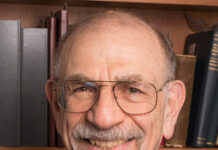By Sabrina Sojourner
Special to WJW
This week’s Torah portion is Matot-Mase’i,
Numbers 30:2 – 36:13.
With 244 verses, this double parshah is the longest read on Shabbat: Vows must be taken seriously. Tzelafchad’s daughters’ request expands Jewish inheritance laws to include daughters. War is waged against the Midianites and the Moabites, and our ancestors are victorious. The boundaries of the land of Israel are marked. Cities of refuge for the unintentional murderer are to be established. We arrive at the Jordan River, ready to cross over.
Personally, I am grateful that Numbers is ending. I have always found its escalating violence both fascinating and troublesome. However, this year it was just hard. In my compartmentalized mind, it was easy to discuss ancient societies, tribes and cultures and the uses of violence to protect, defend
and take.
Certainly, the modern imperialistic view of violence is that it is an important tool to protect, defend and control. Then, we walk away leaving the mess we created.
With the murder of George Floyd, something broke in me, in many of my friends and colleagues. Before his death, I uneasily acquiesced to the general blame the victim attitude that even the most loving of my friends and teachers had toward police killings of Black, Brown and indigenous people. Now, the level of violence we potentially face daily is no longer secret. There is no place in my body to tuck the fear and deal with it alone or with other dark-skinned people.
Police thinking regarding who is suspicious allowed the insurrection on Jan. 6 to occur unimpeded and impeded the thinking of key responders. Officials didn’t want to see the high potential for violence by people who looked like them. Yet, many of us of all colors saw it coming and we are not on the sites that facilitated the planning.
No. The ability to stay silent is no longer available to me. And, I’m realizing it never was.
Through my brokenheartedness, I see the cities of refuge as a theological attempt to interrupt a deeply rooted practice and cycle of violence that only led to more violence.
What would happen if more of us emulated Tzelafchad’s daughters, speaking up to question what we know in our hearts is unnecessarily unfair in the moment that we see it, or as soon as we are made aware of it.
This is not a question. It is an assertion that we often claim to be helpless and unable to make a difference when we’ve never accepted the invitation into the question: Who do we need to be to make a difference?
Rabbi Abraham Joshua Heschel wrote “…morally speaking, there is no limit to the concern one must feel for the suffering of human beings, that indifference to evil is worse than evil itself, that in a free society, some are guilty, but all are responsible.” Tzelafchad’s daughters, the cities of refuge, Rabbi Heschel and the survivors of the Tulsa Massacre are calling us to move through our pretense of indifference to discover what we can do — however situationally — to interrupt the tendency toward violence in our country.
Sabrina Sojourner is a shaliach tzibur and community chaplain.






